-
ORIGINAL ARTICLE12-04-2023
“Fala-M@no-COVID-19”: technological development of a health navigation program for men during the pandemic
Revista Brasileira de Enfermagem. 2023;76(6):e20220534
Abstract
ORIGINAL ARTICLE“Fala-M@no-COVID-19”: technological development of a health navigation program for men during the pandemic
Revista Brasileira de Enfermagem. 2023;76(6):e20220534
DOI 10.1590/0034-7167-2022-0534
Views0See moreABSTRACT
Objective:
to develop a care-educational technology similar to a health navigation program for men during the COVID-19 pandemic.
Methods:
a methodological and qualitative study of a care-educational technology of health navigation program, structured by Program Development Cycle, with 16 patient navigators and 10 professional navigators. It used reflective thematic content analysis and an adaptation model for data processing.
Results:
the ; navigation program was developed by: I) Observation of reality, problem mapping, needs assessment: content selection, creation of domains and questions; II) Theoretical-conceptual and methodological definition, creation of product under the elaboration of care plans, based on theory, process and taxonomies by a flowchart of operationalization of actions; and III) Self-assessment: qualitative research with professional navigators.
Final considerations:
the technology developed, with theoretical and methodological support, allowed to derive a viable navigation program compatible with reality based on the audience’s needs.
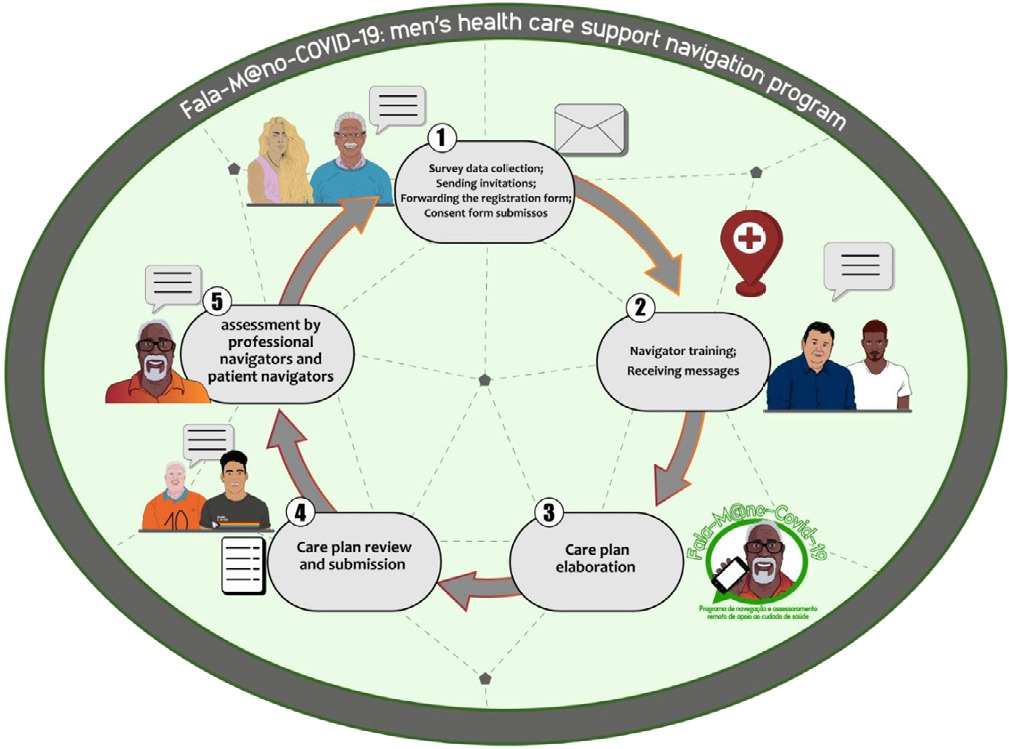
-
ORIGINAL ARTICLE12-04-2023
Social representation of young people in higher education about sexually transmitted infections
Revista Brasileira de Enfermagem. 2023;76(6):e20220406
Abstract
ORIGINAL ARTICLESocial representation of young people in higher education about sexually transmitted infections
Revista Brasileira de Enfermagem. 2023;76(6):e20220406
DOI 10.1590/0034-7167-2022-0406
Views0See moreABSTRACT
Objective:
to analyze the social representations about sexually transmitted infections elaborated by undergraduate students.
Methods:
a descriptive, qualitative study, in the light of the structural approach of Social Representation Theory, carried out with 160 young undergraduate students, in the second half of 2019, in the city of Rio de Janeiro. Data were collected using a sociodemographic characterization questionnaire, knowledge and practices for preventing sexually transmitted infections, analyzed using descriptive statistics and a form of free evocations with the inducing term STD, analyzed using prototypical and similarity analysis.
Results:
the representation’s possible central nucleus is composed of lexicons aids, disease and HIV; the peripheral system by syphilis, sex, condoms, gonorrhea, prevention, infection, carelessness, HPV, herpes, ignorance, treatment, fear, unprotected-sex and danger.
Final considerations:
social thinking about sexually transmitted infections is characterized by their recognition as diseases, which require barrier prevention measures, associating with unsafe sexual practices that arouse fear.

-
12-04-2023
The Medical Healing of Souls: a strategy for welcoming post-pandemic mental health
Revista Brasileira de Enfermagem. 2023;76(6):e20220331
Abstract
The Medical Healing of Souls: a strategy for welcoming post-pandemic mental health
Revista Brasileira de Enfermagem. 2023;76(6):e20220331
DOI 10.1590/0034-7167-2022-0331
Views0See moreABSTRACT
Objective:
to reflect on the applicability of the Medical Healing of Souls (MHS) by health professionals as a welcoming strategy in post-pandemic mental health.
Methods:
a theoretical and reflective study, based on Viktor Frankl’s philosophy, based on the book “The Doctor and the Soul, From Psychotherapy to Logotherapy” and scientific literature.
Results:
the study was structured in two discursive approaches: MHS in the field of health; The applicability of MHS in post-pandemic mental health care.
Final considerations:
MHS can be used in mental health care, in health emergencies, promoting a more humane performance of health professionals, facilitating the integration of inevitable suffering into a meaningful life.
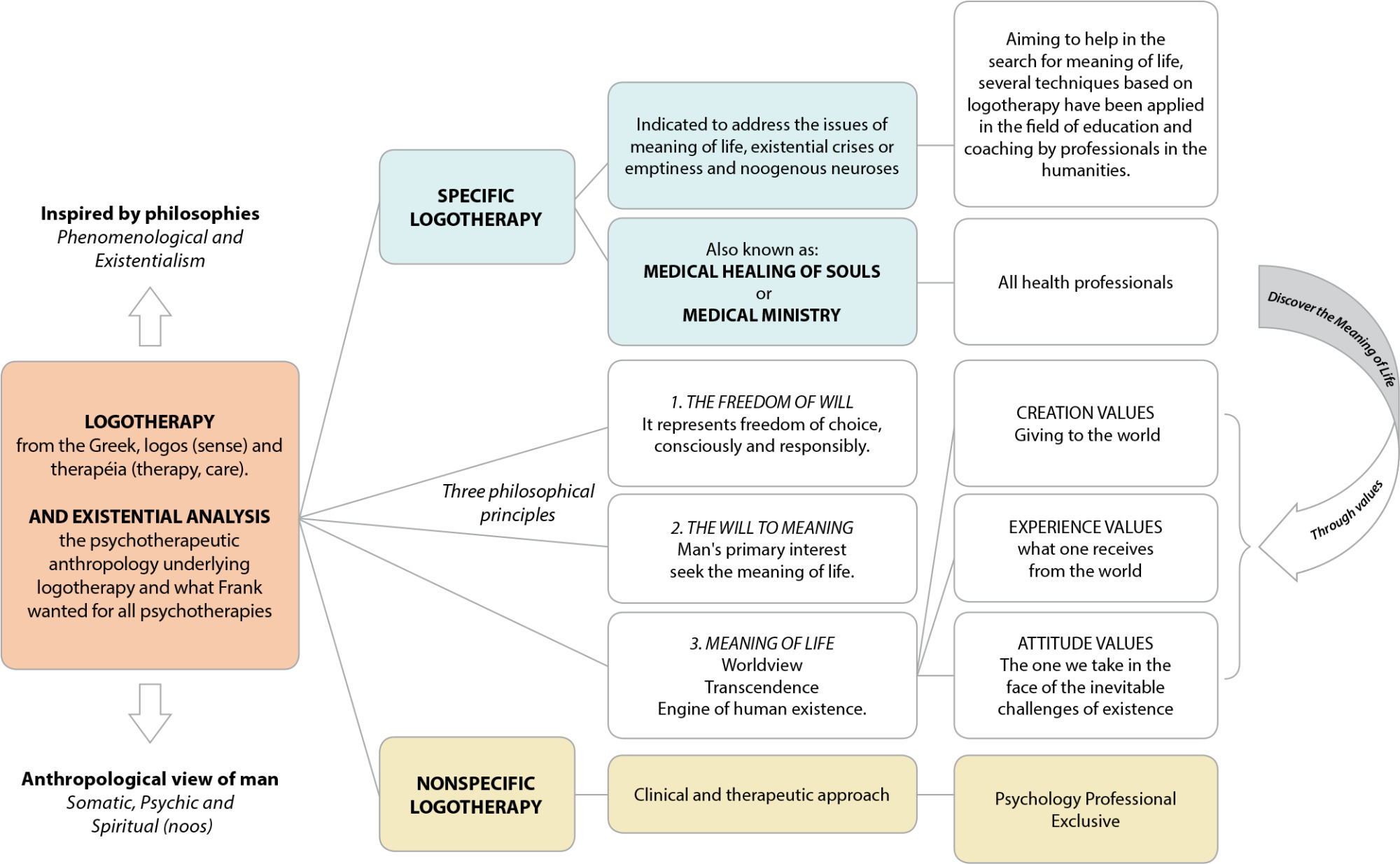
-
ORIGINAL ARTICLE12-04-2023
Translation, cross-cultural adaptation and validity study of the “Play Nicely Program: The Healthy Discipline Handbook” for use in Brazil
Revista Brasileira de Enfermagem. 2023;76(6):e20220281
Abstract
ORIGINAL ARTICLETranslation, cross-cultural adaptation and validity study of the “Play Nicely Program: The Healthy Discipline Handbook” for use in Brazil
Revista Brasileira de Enfermagem. 2023;76(6):e20220281
DOI 10.1590/0034-7167-2022-0281
Views0See moreABSTRACT
Objective:
to describe the translation, cross-cultural adaptation and validity process of the “Play Nicely Program: The Healthy Discipline Handbook” for use in Brazil.
Methods:
a methodological study that followed the translation, back-translation, expert committee assessment, and pre-test steps. The Content Validity Index (CVI) was calculated for both the judge population and the pre-test population. Four translators, seven expert judges in the field of child health and thirty participants in the pre-test, including parents, teachers and healthcare professionals, participated in the study.
Results:
in experts’ analysis (98.4%), a value of 100% of adequate assessments was obtained, and in the target population’s analysis (89.5%), there were 100% of adequate assessments. In both analyses, suggested adaptations were made.
Conclusios:
cross-cultural adaptation and content validity into Brazilian Portuguese of the “Play Nicely Program: The Healthy Discipline Handbook” were considered adequate for application in the target population.

-
ORIGINAL ARTICLE12-04-2023
Assessment of the components of sarcopenia and quality of life perceived of individuals on hemodialysis
Revista Brasileira de Enfermagem. 2023;76(6):e20220677
Abstract
ORIGINAL ARTICLEAssessment of the components of sarcopenia and quality of life perceived of individuals on hemodialysis
Revista Brasileira de Enfermagem. 2023;76(6):e20220677
DOI 10.1590/0034-7167-2022-0677
Views1See moreABSTRACT
Objectives:
to evaluate the prevalence of sarcopenia in individuals aged 50 years or older on hemodialysis; to verify the association between sarcopenia and sociodemographic, clinical, anthropometric factors, components of sarcopenia and quality of life (QoL); and to correlate the components of sarcopenia with QoL.
Methods:
Participated 83 individuals on hemodialysis. Sarcopenia was established according to the current European consensus. Dynamometry to determine strength, calf circumference (CC) and appendicular skeletal muscle mass index (ASMMI) to obtain muscle mass and gait speed (GS) for physical performance. For QoL used the WHOQOL-bref.
Results:
the prevalence of sarcopenia was 32.6% (CC) and 18.1% (ASMMI). There was no association between sarcopenia and QoL. Both handgrip strength (r=0.25) and GS (r=0.36) showed a correlation with physical domain.
Conclusions:
sarcopenia was expressive, and the aspects of functionality determine the physical impairment in this population.
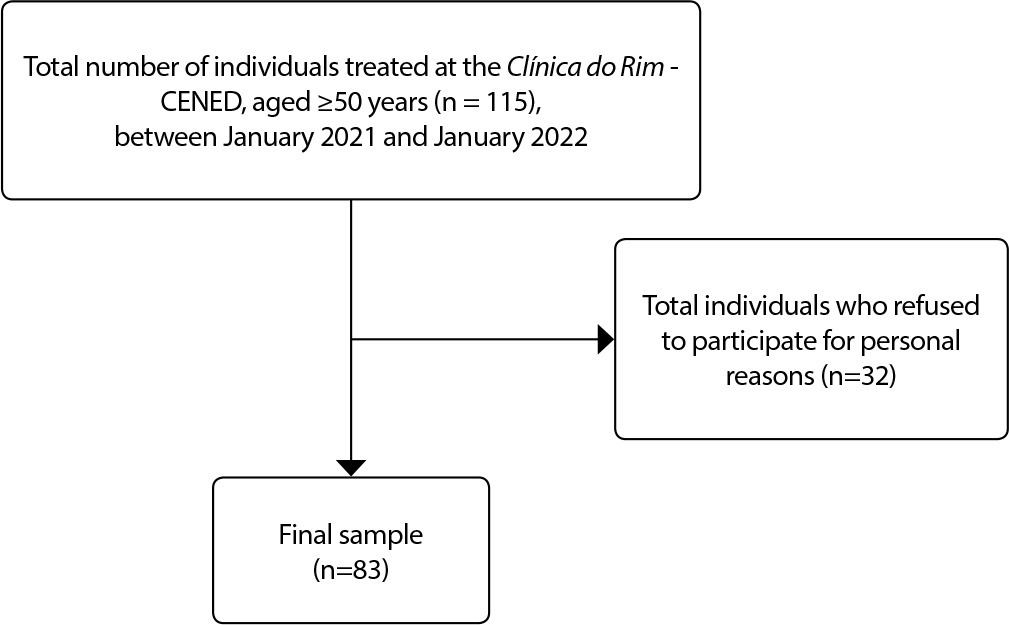
-
ORIGINAL ARTICLE12-04-2023
Effects of auriculotherapy on anxiety and biomarkers in Primary Health Care: a clinical trial
Revista Brasileira de Enfermagem. 2023;76(6):e20220728
Abstract
ORIGINAL ARTICLEEffects of auriculotherapy on anxiety and biomarkers in Primary Health Care: a clinical trial
Revista Brasileira de Enfermagem. 2023;76(6):e20220728
DOI 10.1590/0034-7167-2022-0728pt
Views0See moreABSTRACT
Objective:
to assess the effects of auriculotherapy on anxiety and brain-derived neurotrophic factor (BDNF), neuron-specific enolase (NSE) and S100 calcium-binding protein B (S100B) serum levels in adults assisted in Primary Health Care.
Methods:
a pre-experimental pilot clinical trial. Information was obtained from 19 patients using the State-Trait Anxiety Inventory (STAI) and analysis of BDNF, NSE and S100B serum levels.
Results:
the pre-intervention anxiety score in the IDATE-Trait was 52.11±6.691 (CV 12.84%) and the assessment after auriculotherapy was significantly lower (43.72±8.141; CV 18.62%; P=0.0007). S100B levels were significantly reduced after auriculotherapy (from 64.03±72.18 to 54.03±68.53 pg/mL; CV 126.8%; P=0.0023).
Conclusion:
auriculotherapy effectively reduced anxiety levels. It proved to be safe and easy to apply, allowing nurses to perform this technique autonomously. A reduction of S100B was also evidenced, demonstrating possible prevention of neuronal damage.
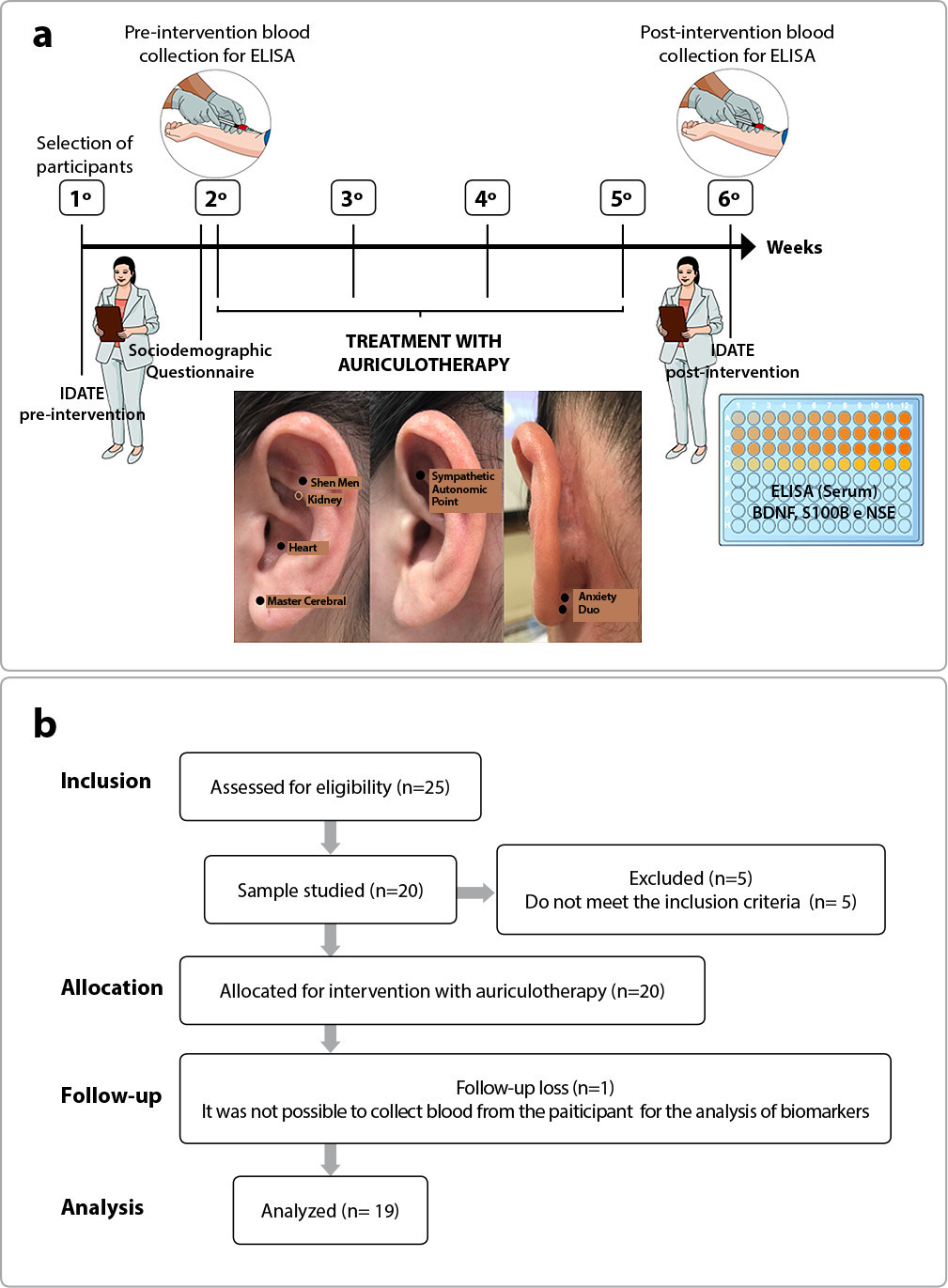
-
ORIGINAL ARTICLE12-04-2023
Leadership Competencies of the Medical-Surgical Nursing Specialist Nurse
Revista Brasileira de Enfermagem. 2023;76(6):e20220721
Abstract
ORIGINAL ARTICLELeadership Competencies of the Medical-Surgical Nursing Specialist Nurse
Revista Brasileira de Enfermagem. 2023;76(6):e20220721
DOI 10.1590/0034-7167-2022-0721
Views0See moreABSTRACT
Objective:
To identify the leadership competencies of Medical-Surgical Nursing Specialist Nurses.
Methods:
A quantitative, descriptive study using the Leadership Competencies Questionnaire. 311 Portuguese Medical-Surgical Nursing Specialist Nurses participated. Data analysis involved descriptive and inferential statistical analysis using the Statistical Package for Social Sciences (SPSS), version 22.0.
Results:
Study participants had an above-average self-perception on the scale (mean = 3.5) in all leadership roles, recognizing their leadership competencies. The leadership competencies of Medical-Surgical Nursing Specialist Nurses are balanced across all roles: Mentor (5.80 ± 1.02); Coordinator (5.53 ± 0.86); Facilitator (5.38 ± 1.04); Innovator (5.34 ± 0.88); Director (5.31 ± 1.10); Producer (5.30 ± 0.98); Monitor (5.15 ± 1.00); Corrector (4.79 ± 1.29)
Conclusions:
Specialized nursing practice enhances nurses’ self-perceived leadership competencies. Nurses see themselves as leaders focused on internal support and facilitation of collective effort and opportunities for skill development.
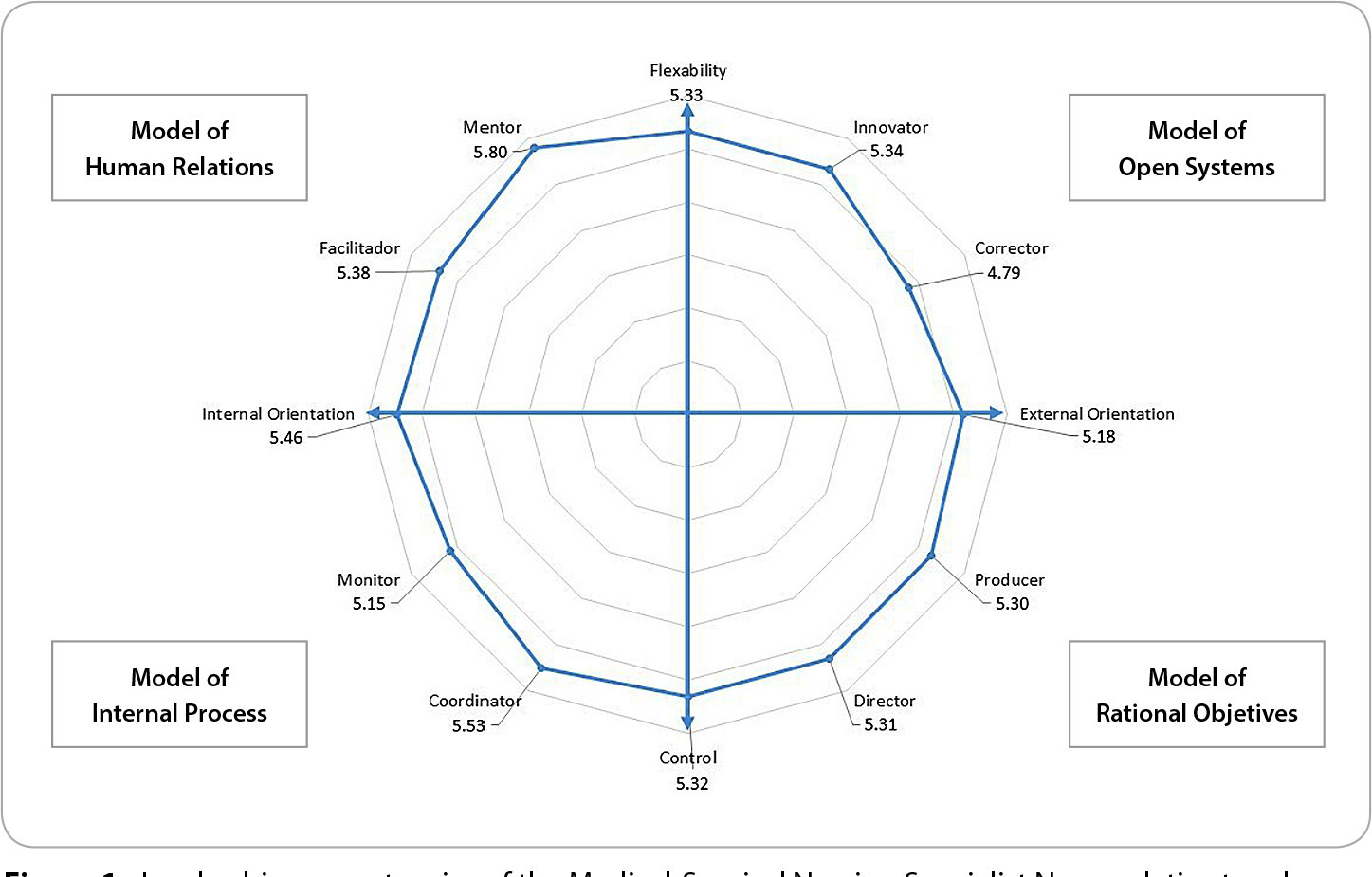
-
ORIGINAL ARTICLE12-04-2023
Feelings about birth by a group of high-risk pregnant women
Revista Brasileira de Enfermagem. 2023;76(6):e20230059
Abstract
ORIGINAL ARTICLEFeelings about birth by a group of high-risk pregnant women
Revista Brasileira de Enfermagem. 2023;76(6):e20230059
DOI 10.1590/0034-7167-2023-0059
Views0See moreABSTRACT
Objective:
to understand feelings about birth among a group of high-risk pregnant women.
Method:
a descriptive and qualitative study, using Alfred Schütz’s social phenomenology as a philosophical theoretical framework. The study included 25 pregnant women undergoing high-risk prenatal care. The interview had the following guiding questions: tell me about your feelings regarding the moment of birth/childbirth; How do you deal with the high-risk diagnosis? What are your expectations for birth/childbirth?
Results:
five categories emerged: Fear of obstetric care; Fear of complications with the baby; Fear of cesarean section; Resilience in the face of high-risk pregnancy; and Expectations for birth.
Considerations:
high-risk pregnant women are afraid of the care they will receive, the risks and concern about the baby’s vitality at birth. The importance of care is emphasized, with a welcoming environment, bonding and communication between health team and pregnant woman.
-
04-14-2021
Nurse-midwives reconfiguring care in the scope of labor and births in COVID-19 times
Revista Brasileira de Enfermagem. 2021;74:e20200863
Abstract
Nurse-midwives reconfiguring care in the scope of labor and births in COVID-19 times
Revista Brasileira de Enfermagem. 2021;74:e20200863
DOI 10.1590/0034-7167-2020-0863
Views0See moreABSTRACT
Objectives:
to analyze how the nurse-midwives of maternity wards that were fields of practice for an improvement course in obstetrics have reorganized care in the context of labor and birth amidst the COVID-19 pandemic.
Methods:
this is a descriptive, exploratory and qualitative study carried out with nine nurse-midwives who are preceptors and collaborators in maternity wards that were fields of practice for an improvement course, between February and April 2020, through a semi-structured interview through WhatsApp®. Content analysis was used to treat the information.
Results:
the pandemic brought the need to reorganize work, with a focus on service training and maintenance of good practices in labor and birth, whose movement was intensely experienced, interfering in nurse-midwives’ mental health.
Conclusion:
nurse-midwives have faced the pandemic with concerns about maintaining safe care, focused on practices based on updated scientific evidence.
-
07-28-2021
The era of precision medicine and its impact on nursing: paradigm shifts?
Revista Brasileira de Enfermagem. 2021;74(5):e740501
Abstract
The era of precision medicine and its impact on nursing: paradigm shifts?
Revista Brasileira de Enfermagem. 2021;74(5):e740501
DOI 10.1590/0034-7167.2021740501
Views0INTRODUCTIONThe large investment and development of research in genomics and molecular biology in the last two decades, especially after the conclusion of the Human Genome Project (HGP), has generated many expectations regarding its impact on the transformation from the conventional medicine paradigm to the precision medicine paradigm(–). The term precision medicine (PM) was used for […]See more -
ORIGINAL ARTICLE07-06-2020
Knowledge and health promotion practice of Family Health Strategy nurses
Revista Brasileira de Enfermagem. 2020;73(5):e20190362
Abstract
ORIGINAL ARTICLEKnowledge and health promotion practice of Family Health Strategy nurses
Revista Brasileira de Enfermagem. 2020;73(5):e20190362
DOI 10.1590/0034-7167-2019-0362
Views0See moreABSTRACT
Objectives:
to analyze the knowledge and health promotion practice carried out by Family Health Strategy nurses.
Methods:
a descriptive study and qualitative approach. The study was conducted with 18 Family Health Strategy nurses from the city of São Carlos. Data were collected through semi-structured interviews and analyzed through thematic analysis. The study was approved by the Research Ethics Committee.
Results:
the data revealed that nurses had difficulties to conceptualize health promotion, and it is common to describe the definition of disease prevention. Nurses also reported developing group activities for health promotion; however, individual actions and consultations were still predominant.
Final Considerations:
it is necessary to develop sustainable strategies for collective health-promoting activities, in addition to strengthening multidisciplinary work and Continuing Education actions.

-
05-21-2021
Quality of life and falls in elderly people: a mixed methods study
Revista Brasileira de Enfermagem. 2021;74:e20200400
Abstract
Quality of life and falls in elderly people: a mixed methods study
Revista Brasileira de Enfermagem. 2021;74:e20200400
DOI 10.1590/0034-7167-2020-0400
Views0See moreABSTRACT
Objective:
to assess elderly people’s quality of life, understanding the social representations of falls.
Methods:
a convergent mixed methods research carried out at homes, with a sample of 134 elderly people. A structured questionnaire was used, covering sociodemographic variables and factors that indicated frailty and risk of falling. For quality of life assessment, Medical Outcomes Study Short-Form 36 and Theory of Social Representations, Abric’s structural approach were used, with data treated by dictionary of equivalent terms, processed in Evoc 2000, converging analytically according to Neuman.
Results:
quality of life impairment was identified in terms of physical, emotional and functional capacity. The elements of the possible central nucleus were fall, fear, and bruised-broken-bone.
Final considerations:
quality of life impairment can contribute to increase the number of falls, which has been shown to be an event present in elderly people’s lives through evocations. Understanding elderly people’s individual demands allows planning actions.

-
REFLECTION07-10-2020
In defense of the Unified Health System in the context of SARS-CoV-2 pandemic
Revista Brasileira de Enfermagem. 2020;73:e20200247
Abstract
REFLECTIONIn defense of the Unified Health System in the context of SARS-CoV-2 pandemic
Revista Brasileira de Enfermagem. 2020;73:e20200247
DOI 10.1590/0034-7167-2020-0247
Views0See moreABSTRACT
Objective:
To discuss the political and structural conditions for establishing the Unified Health System (UHS – Sistema Único de Saúde, SUS) in coping with the SARS-CoV-2 pandemic.
Methods:
Theoretical-reflection study.
Results:
At the first moment named “The global and the local in facing the SARS-CoV-2 pandemic” is presented the health crisis that took place worldwide and the government actions to combat COVID-19. A second moment named “Between dismantling actions and resistance, the UHS is the best way to face the SARS-CoV-2 pandemic”, reflects on the neoliberal attacks on the health system and how it resists, remaining the main pandemic response strategy.
Conclusion:
The strengthening of democracy and the defense of the UHS are the way out of the crisis. It is believed that this reflection generates – in everyone who deals with caretaking – the political action, the ethical attitude, the desire for valorization and the spirit of struggle in defense of the UHS and human life.
-
08-20-2021
Historicity of nursing graduate studies in Brazil: an analysis of the Sociology of the Professions
Revista Brasileira de Enfermagem. 2021;74(6):e20190827
Abstract
Historicity of nursing graduate studies in Brazil: an analysis of the Sociology of the Professions
Revista Brasileira de Enfermagem. 2021;74(6):e20190827
DOI 10.1590/0034-7167-2019-0827
Views0See moreABSTRACT
Objectives:
to analyze the scientific productions about the history of graduate studies in Brazilian nursing in the light of Eliot Freidson’s Sociology of the Professions.
Methods:
an integrative review, carried out in the databases indexed in Virtual Health Library. The Preferred Reporting Items for Systematic Reviews and Meta-Analyses recommendations were followed. Thematic content analysis and Eliot Freidson’s concepts were adopted.
Results:
two categories emerged: “Institutionalization of graduate courses in Brazilian nursing”, highlighting the historical process of professionalization in nursing through transition from empirical to professional care, subsidized by the monopoly of the construction of one’s own knowledge; “The scientific production of graduate nursing in Brazil”, showing the strengthening of a new generation of nurse researchers, given the greater scientificity in teaching due to implementation of graduate studies.
Final Considerations:
the analyzes present the historicity of graduate studies’ institutionalization, supporting the understanding of professionalization outlines of Brazilian nursing.

-
ORIGINAL ARTICLE06-01-2020
Binge drinking and overweight in brazilian adults – CUME Project
Revista Brasileira de Enfermagem. 2020;73:e20190316
Abstract
ORIGINAL ARTICLEBinge drinking and overweight in brazilian adults – CUME Project
Revista Brasileira de Enfermagem. 2020;73:e20190316
DOI 10.1590/0034-7167-2019-0316
Views0See moreABSTRACT
Objective:
To verify the association between heavy episodic alcohol consumption [binge drinking (BD)] and overweight in 2,909 adults from the Cohort of Universities of Minas Gerais (CUME Project) baseline, Brazil.
Method:
Cross-sectional study in which sociodemographic, anthropometric (BMI ≥ 25 kg/m2 = overweight) and dietary intake data were collected. This study evaluated the occurrence and monthly frequency of BD (≥ 4 drinks at one time for women; ≥ 5 drinks at one time for men, in the last 30 days).
Results:
The prevalence of BD and overweight were 41.3% and 40.8%, respectively. BD increased the prevalence of overweight by 19%, and, BD exposure by ≥ 5 days / month increased it by 31%.
Conclusion:
BD on a single or multiple occasion during the month was associated with a higher prevalence of overweight. Therefore, such a lifestyle should be considered in weight gain prevention strategies.
-
REVIEW09-18-2020
Allocation of resources for health care in COVID-19 pandemic times: integrative review
Revista Brasileira de Enfermagem. 2020;73:e20200244
Abstract
REVIEWAllocation of resources for health care in COVID-19 pandemic times: integrative review
Revista Brasileira de Enfermagem. 2020;73:e20200244
DOI 10.1590/0034-7167-2020-0244
Views0See moreABSTRACT
Objective:
To analyze information on resource allocation in the context of the COVID-19 pandemic, published in indexed scientific journals, from December 2019 to March 2020.
Methods:
This is an integrative literature review, which took place in March 2020. All databases were investigated and studies were found only in MEDLINE. After applying the established criteria, six articles were selected.
Results:
It was evident that the allocation of resources is carried out as the demands emerge. The fragility in presenting scientific-methodological evidence that can guide decision makers for assertive allocation of available resources is highlighted. The results showed that studies on this subject are incipient and need to be expanded.
Final considerations:
The need for health organizations and area authorities to be better prepared for the proper use of available resources, with allocation based on scientific evidence and maximization of resources is indicated.

Search
Search in:
Nuvem de Tags
Adolescente (85) Atenção Primária à Saúde (239) COVID-19 (91) Criança (91) Cuidados de Enfermagem (269) Educação em Enfermagem (151) Educação em Saúde (139) Enfermagem (930) Enfermagem Pediátrica (86) Estudantes de Enfermagem (77) Estudos de Validação (131) Família (87) Idoso (208) Promoção da Saúde (99) Qualidade de Vida (104) Saúde do Trabalhador (86) Saúde Mental (145) Saúde Pública (82) Segurança do Paciente (150) Tecnologia Educacional (100)



